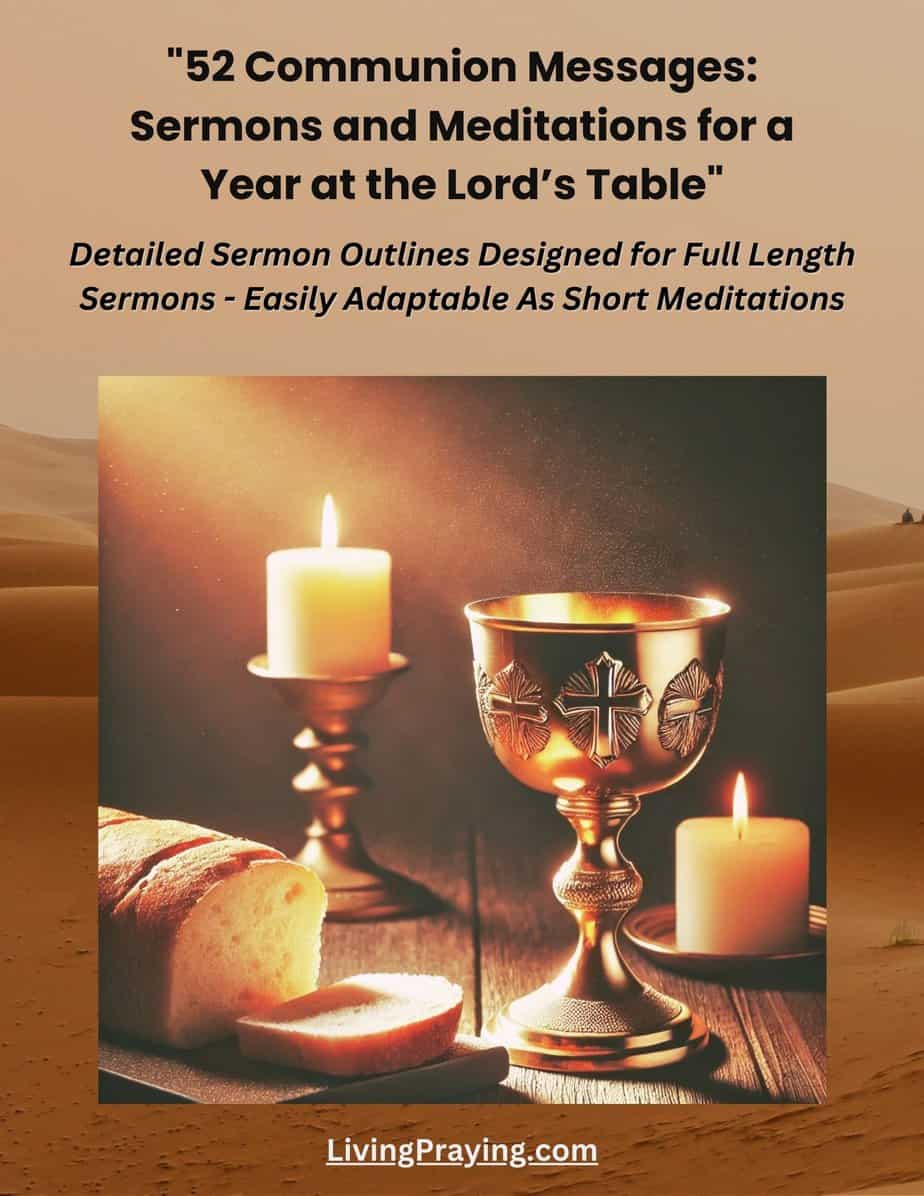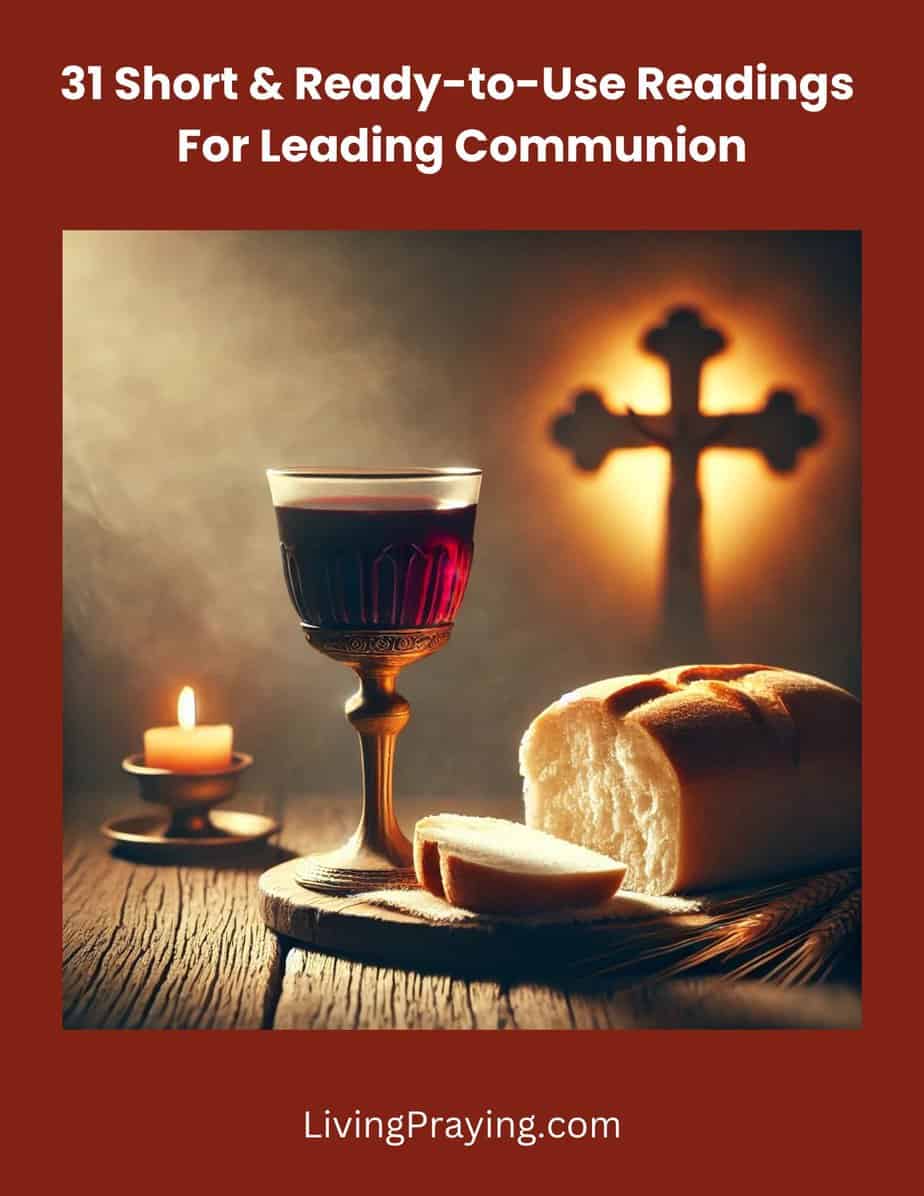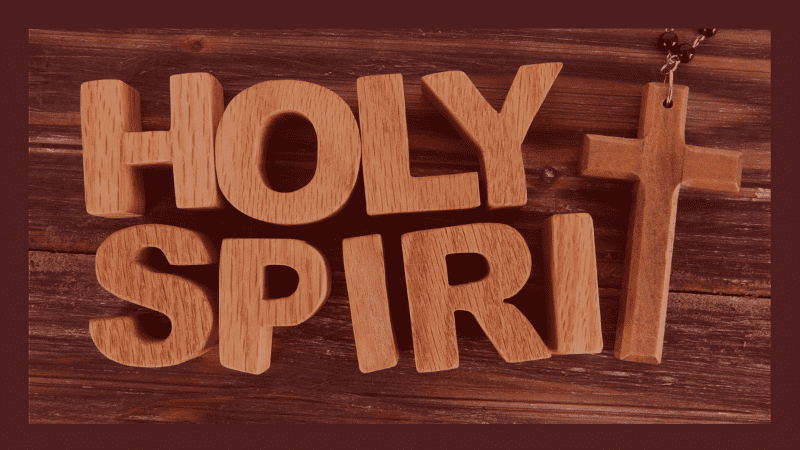The practice of Communion in the Christian church is based on the illustration and command of Jesus to his disciples. In this post, we will use the terms “Communion” and “the Lord’s Supper” interchangeably. If you are looking for Communion meditation ideas we hope this post will help, or at least jump-start you on some ideas.
For the purposes here we come from a protestant perspective. However, anyone who can use these ideas is most welcome to them. Communion is an ordinance established by Jesus Christ as He had his last supper with His disciples. We practice it as a time of reflection and remembrance of the Lord Jesus Christ and His sacrifice.
Some churches make it a part of the service and sometimes there are special services where the entire service is built around the observance of His death is represented by two elements of the Lord’s Supper which are the bread, representing the body of Christ, and the wine, representing the blood of Christ.
Although the Gospels give us a picture of the Lord’s Supper, the Apostle Paul also writes. about it in His first letter to the Corinthian church.
23 “For I pass on to you what I received from the Lord himself. On the night when he was betrayed, the Lord Jesus took some bread 24 and gave thanks to God for it. Then he broke it in pieces and said, “This is my body, which is given for you. Do this in remembrance of me.” 25 In the same way, he took the cup of wine after supper, saying, “This cup is the new covenant between God and his people—an agreement confirmed with my blood. Do this in remembrance of me as often as you drink it.” 26 For every time you eat this bread and drink this cup, you are announcing the Lord’s death until he comes again.”
1 Corinthians 11:23-26
With this wonderful passage of scripture in mind, let’s go on to some communion meditation ideas that you might find helpful as you observe the Lord’s Supper alone or with a group.
Ideas for Communion Meditation (Lord’s Supper)
Many, or most times when we participate in the Lord’s Supper, we or our pastors might normally use the scriptures in the Gospels or Paul’s account in 1st Corinthians as the scripture text. Of course, that is fine.
However, as you may lead a communion service yourself, or have your own personal communion on your own or with your family, you can vary the specific attribute of God on which you might want to meditate for your own purposes.
By looking at these communion meditation ideas and scriptures and focusing on these spiritual perspectives, we hope you will find it meaningful as you dwell on the sacrifice of Jesus and His Holy Word. Below we will give you a number of topical ideas and accompanying scripture passages to go along with them.
Why Communion Meditation Ideas Are Important
Is it not just okay to open your Bible to the Gospels or the account from Paul in 1 Corinthians, read the account of the Lord’s Last Supper with the Apostles when you observe the Lord’s Supper. Isn’t that the way it’s normally done?
Well, yes. Many times so. However, there is no biblical instruction that we have to read the same verses and meditate on those specific verses.
Well, aren’t those verses okay to use? Absolutely. You can go to Matthew 26:26-29, Mark 14:22-25, Luke 22:19-20, and 1 Corinthians 11:23-29 and find the more detailed accounts of Jesus and His Last Supper. Those are great to use.
It’s not that those are bad scriptures to use. They are excellent. However, when you are using scripture and meditating on the truth of God’s word concerning the death, burial, and resurrection of Christ in the observance of the Lord’s Supper, you can also use other passages and themes.
The Lord’s Supper or Communion Meditation Ideas
1. The Sacrifice of Jesus Christ (Scripture: John 19)
In this time of reflection and meditation, you can focus on what Jesus gave up for us. He was willing to leave His Heavenly Father, take on human flesh, and walk and live with ordinary people for 33 years on the earth. Then, He as an absolute sinless one, willingly gave Himself up to the most cruel form of death that was known to men.
Read a portion of John, chapter 19, and think about what He was willing to give up to sacrifice His life to pay for our sins and open up a pathway for us to come to God and have hope in Heaven.
✳️ ✳️ We seldom sell products on our site but right now have two ebooks to help you with Communion. Use them in your worship services, small groups, or your time alone with God.


🕊️ Deliver Meaningful Communion Messages with Confidence!
✔ 52 detailed sermon outlines – one for each week of the year
✔ Scripture-based insights & easy-to-follow format
✔ Use as full sermons or short communion meditations
✔ Closing prayers & application points included
✔ Instant Download – Use This Sunday!
2. His Unfailing Love (Scripture: Ephesians 3:17-19)
Using this meditation topic during the time of the Lord’s Supper, you will want to focus on the steadfast and unfailing love of God. Use the scripture passage in Ephesians chapter 3 to focus on the all-encompassing dimensions of God’s love. Nothing is wider, higher, or deeper than the lavish love that God has for us. His love does not fail. Know that His love even surpasses our knowledge, our mind can’t even conceive it, but we can embrace it. Thank Him and praise Him for His great and unfailing love.
3. Reflecting on the Unity of the Body of Christ (Scripture: Ephesians 3:17-19)
This might be a good topic of reflection when you are in g group setting, but you can use it alone also. Using this scripture and topic of meditation for the Lord’s Supper will have you focusing on the wonder and blessing of being a part of what God calls the Body of Christ. The family of God, those who have received Jesus Christ as their Savior are referred to in several ways.
The body of Christ is one of the ways that God refers to those who have accepted Jesus. Focus on the incredible importance of God’s people being united. Ask the Holy Spirit to flood your heart with love.
If there are brothers or sisters in Christ in whom you have negative or hurt feelings, ask God to help you love and forgive them. In your heart, celebrate the fact that the same God, in the presence of His Holy Spirit is in all believers and that should unite us greatly.
4. Knowing Jesus Intimately (Philippians 3:8-10)
God not only wants us to receive Jesus Christ as our personal Savior but He wants us to grow in an intimate relationship with Him. There can be great joy in meditating on the fact that the Holy Spirit of God is so close that He lives within each of us as believers. Focus on what the Apostle, Paul did in the scripture passage from Philippians 3.
He tells us that everything else is worthless in comparison to the value of knowing Jesus in a personal way. Focus on the fact that, although God may bless us with a great family, friends, and maybe a career, we should put Jesus as the center of our universe.
As you drink the grape juice (or wine) and eat the bread during this time of communion, praise Jesus for His invitation to know Him personally and embrace the relationship with Him.
If you’re looking for great communion meditation ideas, you can’t go wrong looking at the next topic below – God’s grace.

5. A Life of God’s Grace (Ephesians 2:8-9)
Here is a great theme in which you can meditate and focus while you are observing Communion. God’s grace is His incredible unmerited favor that He offers all of those who will believe and receive His Son, Jesus.
As a believer, you can use this time to focus on the fact that there was nothing in your own power that you could do to merit eternal life. It was all because of the sacrifice of Jesus. You can also relax in the fact that not only do you receive salvation by His grace through faith in Him, but you also keep your eternal salvation through grace.
“Just as we received His salvation by grace, we also proceed in our daily Christian walk by faith.”
Colossians 2:6
One of the most famous Christian songs or hymns of all time is “Amazing Grace.” You might want to sing or recite some of the words of this hymn in your time of Communion. The topic of god’s grace is deep and there is much in which to be thankful when we focus on His grace.
6. Topic: Jesus, the Lamb of God (Scripture: John 1:29)

Here is a topic that links the sacrifices of the Old Testament to the final sacrifice of Jesus Christ. Is the scripture passage John the Baptist refers to Jesus as the “Lamb of God lwho takes away the sins of the world.”
Let’s meditate on Jesus being that perfect, spotless lamb. Jesus was pure and there was no sin, no evil within Him. There was nothing about Him that needed to be punished. However, He took on all of our sins once and for all.
His sacrifice doesn’t need repetition; it’s complete and eternal.
As you hold the bread, consider it a symbol of Christ’s body, given up for you.
His sacrifice doesn’t need repetition; it’s complete and eternal. As you hold the bread, consider it a symbol of Christ’s body, given up for you. As you hold the cup, remember it represents the blood He shed to cleanse us. In these moments, let your heart swell with gratitude. Because of the Lamb of God, you are forgiven and loved.
7. The New Covenant (Hebrews 8:6-7)
Using this topic and passage for Communion focus on the fact that we are no longer under the old covenant or the Law. Jesus came to fulfill the law – not because it was bad, but because we did have the power to fulfill it ourselves.
The New Covenant, which Jesus instituted through His blood, wasn’t just an amendment to the Old Covenant but a complete renewal.
No longer are we bound and led by the law; we are now led by the indwelling Holy Spirit, thanks to Christ’s sacrifice. As you sip the wine or juice, let it remind you of this everlasting covenant that allows us to be in a proper relationship with God.
Meditate on the fact that the work of Christ Jesus on the cross was the focal turning point in history as Jesus ushered us from the old covenant to the new. We are thankful for the grace of God given to us through Christ Jesus our Lord.
8. The Crown of Thorns (Matthew 27:29)
One might not naturally think of the crown of thorns as a specific topic on which to meditate in the Lord’s Supper. However, it surely can be. If you choose the topic of the crown of thorns, reflect on this horrible crown that was placed upon Jesus’ head.
This crown meant to mock Jesus, became a symbol of the humiliation and the suffering that Jesus bore on that cross. He not only had extreme pain, but His enemies wanted to bring shame and humiliation upon Him. He endured all of that for us.
The crown of thorns represents the torturous weight of our sins that Jesus willingly took upon himself. It’s hard to believe that a single person could bear this much. We know He was God in the flesh.
Jesus did not call down for pain relief or relief from ridicule and shame. As you hold the bread, a symbol of His body, and the cup, a symbol of His blood, remember that Jesus wore a crown of thorns so that we might wear a crown of eternal life. With each sip and bite, offer a silent thank-you for this immeasurable sacrifice.
9. Perfect Forgiveness (Luke 23:34)
As you participate in the taking of the bread and the wine, let your heart focus and dwell on the extraordinary forgiveness that is offered by Jesus. Even in the midst of excruciating pain on the cross, He prayed to the Heavenly Father, “Father, forgive them, for they do not know what they are doing,” With this, He highlighted an incomprehensible level of mercy and grace.
We can’t fathom that type of love In this moment of Communion, reflect on this perfect forgiveness.
Think about the incredible amount of forgiveness that you have been given by Jesus even in the most excruciating pain. The word “excruciating” actually has its roots in the word “crucifixion” as it is a way to say how horrible that pain was. Focus on Christ with praise and thanksgiving. Also, if there are those that you need to forgive, this would be a great time to submit that to God.
10. Abiding in Christ (Scripture: John 15:4-5)
As you take the bread and fruit of the vine, consider what the Bible means when it says to “abide in Christ.” As the illustration goes, He is the Vine and we are the branches. Jesus invites us to a deep, intimate, and continuous relationship with Him.
Through time spent with Him in prayer, and His word, and simply acknowledging His presence and walking with Him nourishes us and enables us to be spiritually fruitful.
Use this Communion moment to focus and try to make a daily habit of focusing on abiding in Jesus. The Bible says that He abides in us (through the Holy Spirit) and we abide in Him, as we are a part of the body of Christ – His church) That is really secure, don’t you think?
Focus on the wonder and the actual magnificence of abiding in Christ! Reflect on the sustenance and vitality that come from that oneness with Christ, as symbolized through the elements you are about to partake.
Click Here for Communion Supplies – Find high-quality communion cups, pre-filled sets with bread and grape juice, and elegant trays to enhance your church services.
11. Christ in Us (John 14:16-17)

The salvation of a believer is actually what might be termed as a two-sided coin. One is that we abide in Christ. However, if this communion meditation idea we want to dwell on the fact that Christ abides or lives in us in the presence of the Holy Spirit that He promised all believers.
Focus on the verses in John 14. He left a great advocate not just to walk beside us and give us direction from time to time, but to intimately be present within us. Jesus wants to express His life through the lives of His children via the Holy Spirit.
Meditate on that and marvel at the fact that the God of the universe is as close as the breath that you breathe. Ask Him to guide and help you to consistently be aware of His presence in your life. It is a life changer when we can do that. Meditate on this during your time of the Lord’s Supper.
12. The Peace of God (Scripture: Philippians 4:6-7)
In our moments of quiet reflection and meditation on the Lord during the Lord’s Supper, we can use the verses in Philippians to consider the incomprehensible peace that God offers. Through prayer, supplication, and thanksgiving, the Apostle Paul encourages us that we can have peace. You can always have general communication with God (prayer).
But, you also have times when you specifically articulate your needs and requests (supplication). While you pray in this way you should always maintain an attitude of thankfulness for His grace and providence (thanksgiving).
As you focus on this amazing God in whom we can have peace, and partake in communion, try to let go of your anxieties and invite His peace to flood your heart and mind. The mere fact that the God of all creation cares for your innermost worries is a testament to His unfailing love. Thank Him for this extraordinary gift of peace that surpasses all understanding.
13. Jesus’ Thoughts While On The Cross (Luke 23:32-46) and (John 19:26-27)

During your time of Communion, meditate on the extraordinary mindset that Jesus had as He hung on the cross. He was experiencing unimaginable physical suffering, yet His thoughts remained selfless and remained on love and forgiveness. Focus on this amazing aspect of Jesus’ death for you.
For example, He asked His Father to forgive those who had crucified Him. He also gave assurance to one of the thieves hanging beside him that the thief would be in paradise with Him. When he heard the thief hanging next to him and realized he believed, He assured him that they would be together in paradise.
Plus, even in His agony, Jesus thought of His mother, Mary, and made provisions for her by entrusting her to John. As you take the bread and wine, remember that Jesus was not simply giving into the enduring physical pain, but was also emotionally and spiritually engaged in acts of incredible love and kindness in spite of his physical agony.
You may want to take these moments to express your gratitude for such selfless love and to aspire toward such Christlike thoughtfulness in your own life.


🕊️ Deliver Meaningful Communion Messages with Confidence!
✔ 52 detailed sermon outlines – one for each week of the year
✔ Scripture-based insights & easy-to-follow format
✔ Use as full sermons or short communion meditations
✔ Closing prayers & application points included
✔ Instant Download – Start Using It This Sunday!
14. A Life Of Worship (Romans 12:1-2)
A lot of times people use a Sunday morning or other service time to really focus on their. worship of God. Certainly, that is not bad. However, we want to practice a lifestyle of worship. As you partake in the Lord’s Supper, consider how your life is an ongoing act of worship to God.
Unfortunately, there are lots of people who may confine their thoughts of worship to the singing of songs or praying in church on Sundays. However, we want that worship to be an integral part of how we live every day.
Meditate on this thought and ask God to work in you to develop a great desire for worship all through the week. Romans 12:1-2 encourages us to offer our bodies as living sacrifices, which is our true and proper worship. Let the bread and cup serve as a reminder to live a life that honors God in all you do, not just in these moments of communion.
15. The Blood That Redeems (Hebrews 9:22)
During this time of communion, reflect on the transformative power of the blood of Jesus. While the idea of “blood” may seem off-putting to some, for believers, it symbolizes the ultimate sacrifice and redemption. Just as my piano professor found hymns about blood uncomfortable, many may not grasp their significance.
Yet, as Hebrews 9:22 tells us, without the shedding of blood there is no forgiveness of sins. Let the cup remind you of the precious blood that was shed for your redemption, forever changing your life as you believe in Him.
Overall Points Regarding Communion Meditation Ideas
1. Remember that Communion of the Lord’s Supper is something that Jesus asked us to do.
It was instructed by the Lord. Although, He didn’t say do it every day, every week, or even every month (There are some Protestant churches that do it 4 times per year), He did say do it to remember Him. The Apostle Paul’s account of Jesus’ words about the Lord’s Supper doesn’t specify a number of times, only to remember Him as often as you do it.
25 In the same way, he took the cup of wine after supper, saying, “This cup is the new covenant between God and his people—an agreement confirmed with my blood. Do this in remembrance of me as often as you drink it.” 26 For every time you eat this bread and drink this cup, you are announcing the Lord’s death until he comes again.
1 Corinthians 11:25-26 (NLT)
2. Don’t Let Morbid Introspection of Sin Discourage Your From Participating
There is a passage in 1 Corinthians chapter 11 that too many pastors and teachers use with a slightly different interpretation than what many think Paul was saying. Look in Chapter 11, verse 27, and following:
27 Therefore whoever eats the bread or drinks the cup of the Lord in an unworthy manner, shall be guilty of the body and the blood of the Lord. 28 But a man must examine himself, and in so doing he is to eat of the bread and drink of the cup. 29 For he who eats and drinks, eats and drinks judgment to himself if he does not judge the body rightly. 30 For this reason many among you are weak and sick, and a number sleep.
1 Cornthians 11: 27-30
Unfortunately, many have taught that the Apostle was saying to rid yourself of enough sin in your life so that you will be worthy of partaking in the cup and the wine. Well, that can’t be! How many sins would you have to get out of your life to ever be worthy to take the Lord’s Supper? Answer: All of them.
The death, burial, and resurrection of Jesus Christ is the only thing that can make us worthy to participate in this Holy Ordinance. so, what is Paul’s warning about? Well, it’s found a few verses before in the same chapter:
20 Therefore when you meet together, it is not to eat the Lord’s Supper, 21 for in your eating each one takes his own supper first; and one is hungry and another is drunk. 22 What! Do you not have houses in which to eat and drink? Or do you despise the church of God and shame those who have nothing? What shall I say to you? Shall I praise you? In this I will not praise you.
1 Corinthians 11: 20-22
You see, some people at the Church in Corinth eating first without regard to those who may not have any, some were getting drunk at the Lord’s table. They were not in unity with one another and as the New American Standard Bible states, “they were eating the bread and drinking the cup in an “unworthy manner.”
Many times we have taken this passage to mean that we have to get morbidly introspective about sin and make sure we have confessed every sin in our life before we take communion or God is going to zap us.
However, the “unworthy manner” to which Paul was referring was the ungodly way in which the Corinthians were “celebrating” the Lord’s supper. Some were causing divisions rather than being united as a body of believers. Some were eating too much and getting drunk, while others were left hungry.
They were turning this solemn event into a feast that was apparently focused on a party time for themselves. The Lord’s Supper had strayed far from its intended purpose of solemn reflection on Jesus and our unity as believers.
Paul emphasizes the seriousness of the Lord’s Supper and its original purpose, which is to remember Christ’s sacrifice and proclaim His death until He returns.
So, if God brings to mind a sin to confess as you participate in the Lord’s Supper – such as pride, gossip, envy, etc., by all means, do so. However, Paul’s intention was not for us to be fearful that we have not confessed a sin and now it’s time to get morbidly introspective and try to get everything confessed before the bread touches our lips.
He was addressing specifically the sin of those who were displaying irreverent and divisive behavior during what was supposed to be a solemn and unifying observance of the Lord’s Supper.
3. Let Your Heart Overflow With the Joy of Christ
When you participate in Communion, receiving the bread, symbolic of the body of Christ, and the cup of blessing – the juice- as representing the blood of Jesus, let your heart be so thankful and full of praise to Jesus for what He has done. This is a beautiful picture of the sacrifice that was made for us to save us from our sins.
We should have grateful hearts and hearts full of love and joy for the love given to us by our Savior.
Thanks be to God for His incredible love for us and for the payment of our sins! Rejoice in the Lord’s Supper!
I hope that some of these communion meditation ideas have been helpful to spur you in your meditation and worship while you are celebrating the Lord’s supper. Meditation on the Lord Jesus Christ and His sacrifice for us can make the time of Communion extremely special.





Leave a Reply